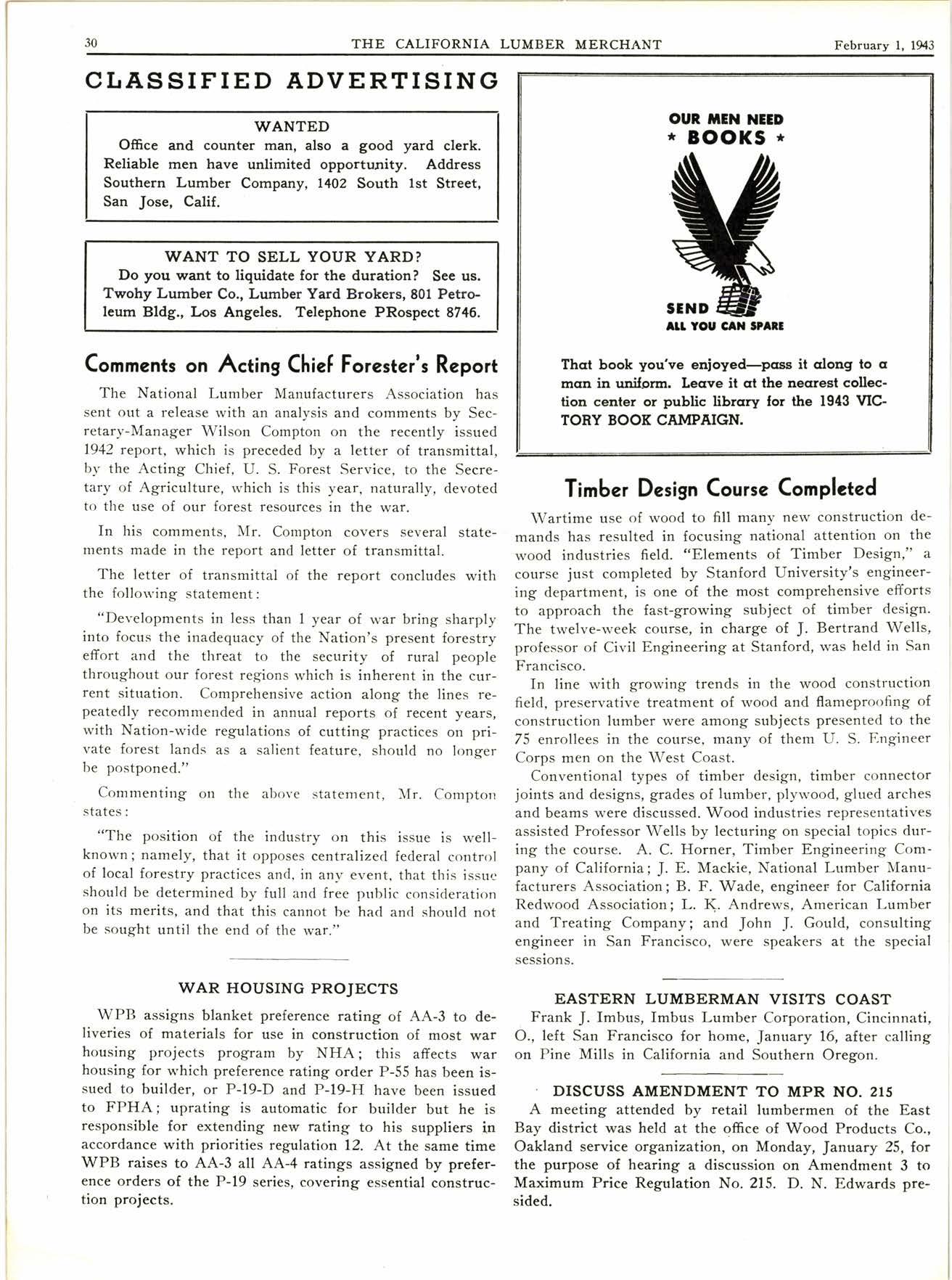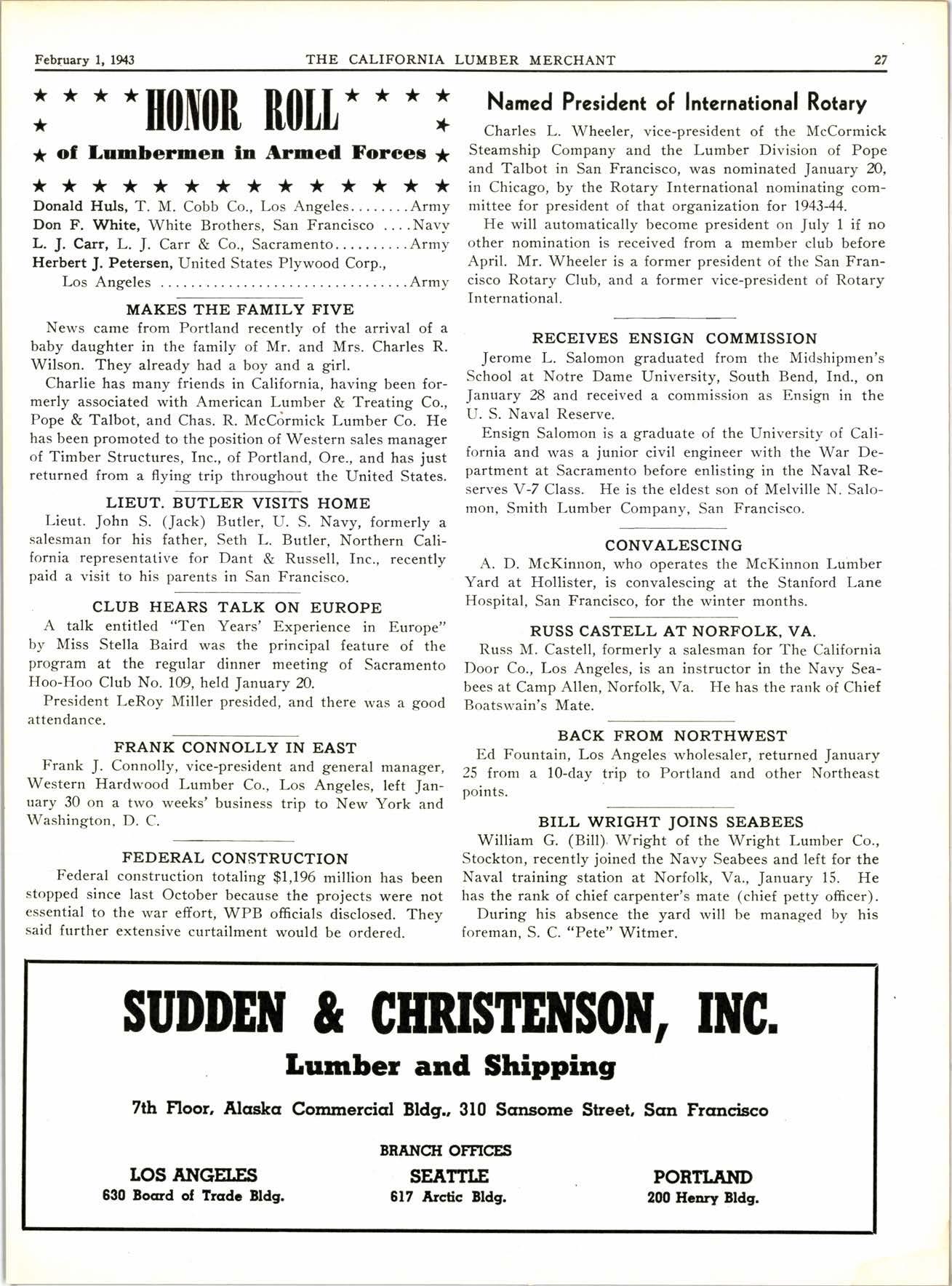
7 minute read
Harvey L. Miner Celebrates Seventieth Birthday
In 1893, when he has twenty years old, Reverend Murray came through Fowler and persuaded him to try the lumber buisiness. Robert McFadden gave him a job bucking lumber at twenty cents an hour for ten hours a day. In the fall he returned to Fowler, having decided there was not much of a future in the lumber business.
On October 16, 1895, he married Miss Cora McCaw. The McFaddens employed him at their South Riverside yard which later became known as the Corona Lumber Co. This job paid him $50.00 per month. They moved by horse and wagon to Santa Ana in October, 1896, and Mr. Miner continued to work for the McFaddens. When the McFaddens sold out, he 'ivent with the Pendleton Lumber Co., at Santa Ana.
Taking his famill' to San Pedro in 1902, he worked for the E. K. Wood Lumber Co. Then he went with the L. W. Blinn Lumber Co., later with the South lVestern Lumber Co., which afterwards became the Consolidatecl Lumber Co.
When Harvel' L. Miner, vice-president of the WhitingMead Co. at San Diego arrived at the office on the morning of January 26, he received greetings from the office and yard personnel, the occasion being his seventieth birthday. W. H. Mead of Los Angeles, president of the WhitingMead Co., presented Mr. Miner with a plaque which carried the names of the employees of the company's various yards. I{is many lumbermen and other friends extended their best wishes r.vith a birthday card showerhe received over 200 cards. This also is Mr. Miner's fiftieth year in the lumber business.
Mr. Miner lvas born on a farm at Murray, Nebraska, January 26, 1873. The family, including his parents and two younger brothers, came to California when he was seventeen years old. He first worked on a ranch near Santa Paula.
His parents located on some raw land at Fowler, Calif. He developed and improved the farm, between times working c"rn a threshing crew at different localities in the San Joaquin Valley. A peculiar coincidence is that W. H. Mead, with whom he later became associated in business, was working on a threshing crew at the same time although they didn't get acquainted until many years later.
He moved to Long Beach in 1905 ancl became associated rvith the Interstate Dock & Lumber Co., after which he rvent with the Blinn-Robinson Lumber Co. About 1910, he joined the Long Beach Improvement Co. 'ivhich rvas bought by the Hayward Lumber Co., anrl in tnrn by the Patten-Blinn Lumber Co.
In 1915, he vrent to rvork for the Whiting-Mead Co. at Los Angeles as a commission salesman. The following year they sent hirn to San Diego to liquidate the business they had there, which had been established four years before. After a year in San Diego, it looked as if there might be an opportunity for development in that area and this forecast proved correct. From one store, at that time located at First and G Streets, the company nolv has five stores in that section, in the follorving localities: San Diego, East San Diego, El Cajon, Oceanside and El Centro.
Mr. Miner is active in the business affairs of the Whiting-Mead Co. at San Diego. A fine businessman, he is one of the outstanding lumbermen in Southern California. With a kindly disposition and a keen understanding of men, his judgment is highly respected and he is held in very high esteem by the members of the lumber industry.
Mr. and Mrs. Miner have three children; Glen M. Miner, secretary and general manager of the Whiting-Mead Co. at San Diego; Everett Miner, and Mrs. Phil West.
The Logt Landmark
The National Hotel of North San Juan, a picturesque lumber-built structure, erected in the early fifties was totally destroyed by fire, December 21, L942. Its passing is deeply regretted by all those who have enjoyed its gracious hospitality.
It was only an ancient landmark
To strangers who passed this way, But it held the golden romance Of another time and day; It linked the past with the present And seemed to be waiting there For the future we know is coming When life shall be peaceful and fair.
I wish that it could have spoken And the long, long story told Of its place in the vivid picture Of the stirring days of gold. It witnessed the rise to power Of the great hydraulic mines And the growth of little cities
In their setting of tree and vine.
It waited while man made canyons
Grew wide and deep and long
And the music's music mingled
With the monitor's roaring song.
It knew the time of trouble
When ditches were parched and dry
And ghost towns waited in silence
As the long, long years passed by.
It 'r.r,'as more than an ancient landmark
That hot flames swept away, For memories lingering about it
Shall live for many a day.
Picturesque, sturdy structure, We grieve as we say, "farewell," But the memories you held we cherish
And your fame our lips will tell.
A. Merriam Conner.
Calls On Mills
A. A. (Al) Derry, Anglo California Lumber Co., Los Angeles, is back from a trip to iVorthern California and Southern Oregon, where he called on the Pine mills.
Wegt Coast Annual Meeting
With war service of the West Coast lumber and logging industry as the theme, the stockholders of the West Coast Lumberman's Association held their 1943 annual meeting at Tacoma on Friday, January 29. Conf.orming to wartime restrictions, the meeting was confined to a forenoon business session, and an open conference with officials of national war agencies concerned with lumber supply, with adjournment after a luncheon session for stockholders, war subscribers and guests.
The essential purpose of the meeting was to transact necessary business and to clear up the outlook on West Coast lumber's part in the war effort during the months ahead. \ ICLA Trustee Judd Greenman presided over the war service session, and Vice-President C. H. Kreienbaum presented the luncheon speakers.
Orville Miller, WCLA President, addressed the luncheon session on "The Lumber Industry Takes its Part in the War," followed by a talk on "Air Porver for Victory,', by Geoffrey F. Morgan, Douglas Aircraft Company, and a motion picture presentation, "Wood Goes to 'War,,, by Roderic Olzendam.
"Harold E. Holman. Fred H. Brundage and George B. Carpenter appeared in the rnorning for the War production Board; Peter A. Stone and Louis Gervais for the Office of Price Administration; General H. G. Winsor, L. C. Stoll and A. F. Hardy for the War Manpower Commission; W. T. Deadrick, J. F. Mahoney, R. L. Hennessy and Earl Williamson for the Lumber Procurement Ofifice of the Corps of Engineers; and for the National Lumber Manufacturers Association, Dr. Wilson Compton, secretary and manager.

Ralph Lamon Promoted
Following a course at Officers Candidate School No. 1, Fargo, North Dakota, Ralph Lamon, son of Fred Lamon of Lamon-Bonnington Co., San Francisco, was graduated last month as a 2nd Lieutenant.
He was on a short leave visiting his parents in Berkeley, Calif., and reported for duty at Chicago, January 19.
Makes Southern California Trip
Harold J. Ford, sales manager, Yosemite Sugar pine Lumber Co., made a business trip to Southern California last week.
A Parody On A Soldier Of The Legion
A soldier of the Russians, Lay wounded at Tschrtwkjskivitch, There was lack of woman's nursing, And the other comforts which Might add to his last moments, And smooth the final way, But a comrade knelt beside him, To hear what he might say. The wounded Russian faltered, As he took his comrade's hand, And he said "I never more shall see My own, my native land; Take a message and a token To some distant friends of mine, For f was born at Smnlxerskggryzski, Fair Smnlxerskggryzski on the Irkztrvzkimonov.
The British Sense Of Humor
Demonstrating that no matter how serious the war, the people of Britain help keep up morale by exercising their sense of humor, is the fact that many harmless controversies have been carried on over there during the last several years, that served to take their mindq off the war.
As an example, someone started a national discussion over the radio by seeking suggestions as to how a fy lights on a ceiling. Famous biologists and other scientific people helped the thing along by entering into the discussion and supplying their opinions on this matter. The fact that nobody offered any convincing testimony as to just how the fly accomplishes the thing, shows that the fellow that started it has a lot of sense. ff you, gentle reader, think it a childish object, just try and offer YOUR explanation, and see how you come out.
There is no argument about the method of approach. This seems to be hereditary and standardized. But the final maneuver which allows the fly to make a safe turn upside down, and then stick to the ceiling, has not been explained, although millions of British guessed at it. The only point on which all seem to agree is that it would be a very dangerous experiment for an airman to make, and none of them have yet tried to make a good three-point landing .upside down on the ceiling inside the airplane hangar.
private Jones ,".:"::Trt"""T,"st one week, when the sergeant said to him one day:
"Well, Jones, what do you think of the army as far as you've gone?"
And Jones said: "Oh, I may get to like it after a while, but as far as I've gone I'd say that there's entirely too much drilling and messing around between meals."
He Knew Him
The glittering big limousine driven by a liveried chauffeur drove up to the gate of the army camp, and a haughty, grey-haired, heavily jeweled dowager accosted the keeper of the gate.
"Oh, young man," she said. "f'm looking for my son. His name is Reginald Vandergrift. Surely you can tell me where he is."
"Fraid not, lady," said the soldier.
"Oh, but you must," said she. "fle's so distinctive looking; tall, blonde, wears glasses, and has a very patrician air."
A light broke over the face of the soldier at the gate.
"Oh, sure," he said. "I know him." Then raising his voice and cupping his mouth in his hand he shouted toward the nearest tent:
"Ifey! Stinky! Ilere's your maw!"
A Matter Of Viewpoint
John O'Reilly, of the New York Herald-Tribune, writing concerning the various viewpoints of different soldiers regarding the sights they see abroad, tells of the New york boy who had been in the contracting business back home. And when he got his first view of the Great pyramid, he just said:

"Boy! What a contract!"
Same Idea
A gang of soldiers were talking things over in Holtywood, and a boy from Harvard said:
"They certainly do have some pulchritudinous girls around the Hollywood canteen."
And Big Boy Bowen, from Amarillo, chimed in:
"Aw, what the hell's the difierence so long as they're good lookin'."










